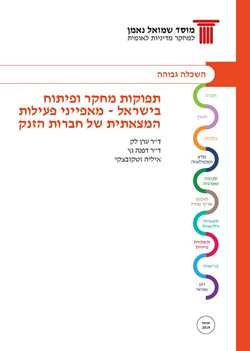
Indices for Science, Technology and Innovation in Israel and international comparison
At the beginning of the 21st century, the Samuel Neaman Institute identified the need to establish an infrastructure for advancing a systematic and ongoing process of forming national policy on Science, Technology, and Innovation (STI). The objective of this program is to improve the understanding of the STI system of Israel and to answer the question of how processes associated with the development of science, technology, and innovation contribute to increased knowledge, increased productivity, improved economic performance, professional employment, sustainable development, and social welfare. Understanding of the process is based on the collection, analysis, and correct presentation of the various relevant indices and on the analysis of trends as they change over time and in comparison with other countries.

Integrating the Ultra-Orthodox Population in the Israeli Economy
The Ultra-orthodox (U-O) Integration Project was inaugurated at the Samuel Neaman Institute in 2010, following the recommendations of the ”Israel 2028” Project. The goals of the UOI Project were to investigate the subject and provide recommendations as to how to enhance the participation of the U-O population in the labor market in Israel. During the last 5 years, the project team has produced a multitude of analyses on various aspects of the subject matter and has published numerous reports, which in turn had significant impact on the national policy in this area.

Review of funding sources for universities in the world
Institutions of higher education face many financial difficulties affected by changes in revenues and operating expenses. Universities are exploring different approaches to dealing with such economic difficulties. There is no single model that may apply to all academic institutions. The solutions can be classified into several tracks: increasing revenues, streamlining operations, creating collaborations and merging academic institutions, as well as "reinventing" the institution.

University-Industry Relations
Review and critical evaluation of university-industry relations based on data and quantitative indicators. Development of insights regarding optimal policy and models to balance between technology commercialization and technology transfer, which is largely based on cooperation with industry to support industrial research. Recommendations for policy steps based on the insights resolved, addressing the point of view of the well-being of society and national economy.

Tax Benefits for Business R&D in Israel
This project examines the tax incentives system to encourage R&D in the business sector in Israel. More than two thirds of OECD countries and many others encourage R&D activities in the business sector with tax benefits based on the volume of R&D expenditures reported by the firms.

Sectorial Specialization and Diversification Indices for R&D
Economic activity that is concentrated in a small number of sectors could indicate specialization and that competitive advantages are being exploited. However, it can also render the economy vulnerable to risks arising from technological and economic shocks.

R&D outputs in Israel: Inventive Characteristics of Start-ups
January, 2019
The report focuses on the inventive activity of Israeli start-up companies. In the framework of the project, data on 9778 Israeli start-up companies, established between 2002 and 2015 was collected from the IVC database and was consolidated with patent data originating from the EPO- PATSTAT database. The report presents updated statistics on the inventive activity of Israeli inventors and applicants. This includes: Analysis of patent applications in the PCT track; Analysis of inventive activity by leading assignees; Distribution of inventive activity by sectors and technological fields and an analysis of the globalization aspects of inventive activity. The analysis of the inventive activity of Israeli start-up companies includes: Description of the activity over time; Distribution of patent applications by the firm’s main field of activity and the technological classification of the patent; Geographical distribution of distinct inventions (patent families) of start-up companies; and an analysis of the relationship between exits and the firms’ life cycle stage on the one hand and their inventive output on the other hand.